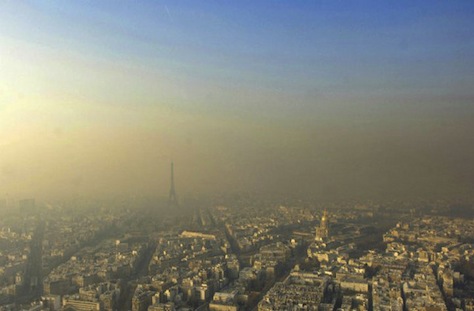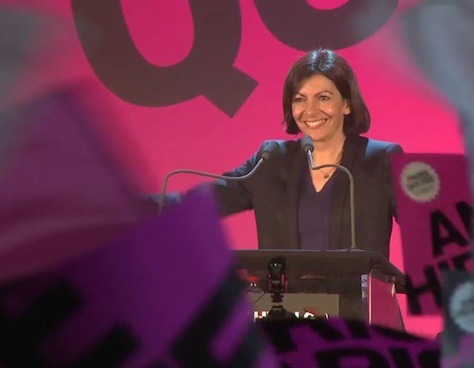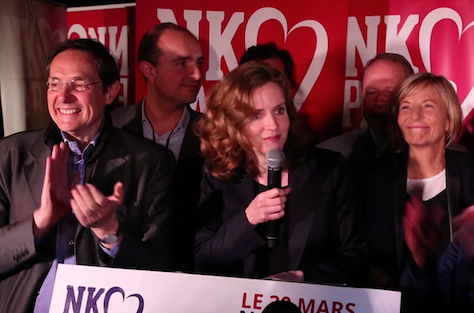The success of the far-right Front national (FN, National Front) dominated headlines from Sunday’s municipal elections in France.
![]()
![]()
In Paris, though, the mayoral race has shaped into a predictably traditional runoff between the French left and the French right, a personality-driven campaign to determine whether Anne Hidalgo or Nathalie Kosciusko-Morizet will become the first woman to serve as the city of France’s capital.
Though president François Hollande and the Parti socialiste (PS, Socialist Party) may be faltering throughout the rest of France, and though Marine Le Pen’s Front national may be cutting into the traditional strongholds of both the Parti socialiste and the center-right Union pour un mouvement populaire (UMP, Union for a popular movement), Paris remains a stronghold for the Socialists. Outgoing mayor Bertrand Delanoë, one of the few members of Hollande’s party with robust approval ratings, is leaving office after 13 years as the city’s third directly elected mayor — former president Jacques Chirac held the office from 1977 to 1995.
Polls show that Parisians will likely replace him with Hidalgo (pictured above), an Andalusia-born official who’s served as Delanoë’s first deputy mayor since he took office in 2001. In a city where residents seem largely happy with the status quo and with Delanoë, Hidalgo is the narrow frontrunner to win in Sunday’s second-round runoff. Delanoë’s rise has coincided with the capital city’s leftward shift, as longtime working-class Socialist voters join educated professionals to give the Socialists an increasingly strong electoral coalition over the past decade.
As mayor, Delanoë has increased housing and social welfare spending, though he might be most well-known for two things.
First, he was one of the world’s first openly gay high-ranking officials — Delanoë’s longtime honesty about his sexuality helped paved the way for greater LGBT acceptance throughout Europe. Secondly, Delanoë’s Paris has been at the vanguard of the urban livability trend. He created the Paris-Plages project in 2002, which every summer recreates a beach, complete with sand and palm trees, on the banks of the Seine. In 2007, Paris became one of the first major global cities to institute a bike-sharing programs, Vélib’, which today is the largest program of its kind outside of China.
Gaffes from both women have dominated the campaign’s coverage. Kosciusko-Morizet (pictured above), who comes from a wealthy background, has had a difficult time shedding her often awkward aristocratic mien. Her comments romanticizing the Paris metro as a ‘charming place’ overshadowed an otherwise welcome plan to keep it open until 2 a.m. on weekdays. But her background as a rising star from the UMP’s moderate wing, her experience as France’s environmental minister, and her high-profile role as campaign spokesperson for Nicolas Sarkozy’s 2012 presidential campaign makes Kosciusko-Morizet a better fit for Paris than other prominent UMP figures. She’s given the French center-right a chance of becoming Paris’s next mayor — even if she loses in the second round to Hidalgo, she has raised her profile considerably.
Hidalgo, in the meanwhile, is campaigning largely on consolidating and extending the gains of the Delanoë administration — more green space, 10,000 new homes a year (65% of which would be public housing), and extending not only the Paris metro, but the Vélib’ system to scooters (Scooterlib’) and electric cars (Autolib’).
But the literal cloud hanging over the municipal elections is the recent smog that enveloped Paris.
The sudden increase in pollution was due to a combination of factors, including weather patterns that trap harmful particles in the air in Paris’s Seine River valley. For one day, on March 17, Paris’s city government instituted restrictions on car use — motorists with even-numbered registration plates would risk a €22 fine for going out. The government revoked the restrictions after just one day, arguing that pollution had lowered sufficiently. But the restrictions launched a fierce debate in France over pollution levels that are typically more associated in global headlines with Beijing and Hong Kong, not Paris.
Though Hidalgo and her allies blamed Kosciusko-Morizet and the Sarkozy administration for insufficiently regulating air pollution, Parisian voters might yet turn against Hidalgo for the government’s handling of the smog incident. On the other hand, a renewed emphasis on traffic and pollution may have given a boost to the third-place candidate, Christophe Najdovski, of the Europe Écologie – Les Verts (EELV, Europe Ecology — The Greens), who has joined an electoral pact with Hidalgo and the Socialists. Hidalgo and the Socialists have pledged to eliminate diesel by the year 2020.
Kosciusko-Morizet actually won the greatest number of votes in the first round (35.91%), but Hidalgo (who won 34.40%) can expect that supporters of green and other more socialist candidates in the first round (around 14% of the electorate, including 8.86% for Najdovski) will back her in the runoff.
What does the Parisian election mean for national politics?
Though Chirac famously used Paris as a springboard for the French presidency, Delanoë’s attempt to win the leadership of the Socialist Party in 2008 against Ségolène Royal and Martine Aubry failed.
If Hidalgo wins, it will give the Hollande administration and the Socialist Party some comfort that, even at the nadir of its popularity, it can still hold onto its urban strongholds. If Hidalgo somehow comes up short on Sunday — and it’s a very real possibility — it will make the Socialists’ bruising first-round result on March 23 seem like a picnic.
If Kosciusko-Morizet wins, it would be almost as stunning as Boris Johnson’s initial victory in the London mayoral race six years ago. It would also put her instantly into the top tier of candidates to lead the UMP in the 2017 presidential elections (unless, of course, Sarkozy decides to mount a comeback bid). In contrast to former foreign minister Alain Juppé, former prime minister François Fillon or UMP secretary-general Jean-François Copé, Kosciusko-Morizet would represent a break with the Gaullist right that many French voters could find refreshing.
Photo credit to julietinparis.wordpress.com.


